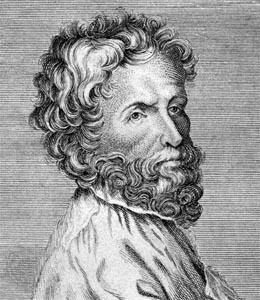Morales, Cristóbal de
Spanish composer
born 1500?, Sevilla, Spain
died between September 4 and October 7, 1553, Marchena?
 composer who, together with Tomás Luis de Victoria and Francisco Guerrero, is recognized as one of the three most important Spanish composers of the 16th century.
composer who, together with Tomás Luis de Victoria and Francisco Guerrero, is recognized as one of the three most important Spanish composers of the 16th century.Morales's first post was as maestro de capilla at the cathedral at Ávila (1526–29). After a short stay at Plasencia he joined the papal choir in Rome (1535), where he remained for 10 years, during which time he published several collections of his compositions. His work and travels with the papal choir greatly advanced his fame. During this period his health seems to have suffered, and he returned to Spain in 1545, where he was appointed maestro de capilla at Toledo Cathedral the same year. He left after two years, and, after a period at Marchena in the service of the duke of Arcos, he was appointed maestro de capilla at Málaga in 1551.
Morales's reputation continued to grow after his death. His works were published widely during his lifetime and quickly found their way to cathedrals as far away as Cuzco in Peru. The earliest printed polyphony prepared for use in the New World was Morales's 1544 book of masses (mass), now part of the cathedral treasure of Pueblo, Mexico.
Of his 21 masses, 16 were published in Rome in 1544, under Morales's personal supervision. Morales was the first Spanish composer to write magnificats in all eight ecclesiastical modes. They were unquestionably the most popular of his works in the 16th century and were widely reprinted. Of his many motets, the two best known are Lamentabatur Jacob and Emendemus in melius, both in five parts. His motet Jubilate Deo omnis terra (in six parts), commissioned by Pope Paul III to mark the peace treaty between Charles V and Francis I, was later parodied by Tomás Luis de Victoria in his mass Gaudeamus, and Francisco Guerrero based his mass Sancta et immaculata on the same motet. No less a figure than Giovanni Palestrina parodied a Morales motet for his mass O sacrum convivium.
- Rustamid kingdom
- Rustaveli, Shota
- Rustavi
- Rustenburg
- rust fly
- rustication
- rustic style
- rustic ware
- Rustin, Bayard
- Ruston
- rutabaga
- Rutaceae
- Rutan, Burt
- Rutebeuf
- Rutger Jan Schimmelpenninck
- Rutgers, The State University of New Jersey
- Ruth, Babe
- Ruth Bader Ginsburg
- Ruth Benedict
- Ruth, Book of
- Ruth Brown
- Ruth Draper
- Ruthenian
- ruthenium
- Rutherford